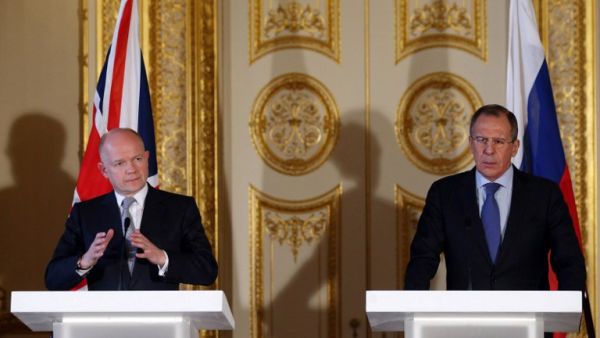Russian Foreign Minister Sergei Lavrov warned Wednesday that arming Syrian rebels would breach international law, after Western powers dropped growing hints about giving military aid.
Speaking in London after talks with his British counterpart William Hague, Lavrov also reiterated that it should be left to Syrians to decide the future of President Bashar Assad.
Lavrov’s comments came a day after Prime Minister David Cameron said Britain would consider ignoring a European Union arms ban and supply weapons to Syrian rebels if necessary.
“Arming the opposition is in breach of international law,” Lavrov said at a joint news conference with Hague, British Defense Secretary Philip Hammond and Russian Defense Minister Sergey Shoigu.
“International law does not allow, does not permit supplies of arms to non-governmental actors and in our point of view it is a violation of international law.”
Lavrov rejected any chance of Moscow urging Assad to step aside to end the 2-year-old conflict.
“I believe the destiny of Bashar Assad should be decided by the Syrians themselves,” he said.
With the conflict in Syria worsening as it enters its third year Friday, Western powers have stepped up non-military support for Syria’s rebels, even as Russia has continued to arm its ally Assad.
Britain and the U.S are currently giving “nonlethal” support to the rebels but Hague and Hammond refused to rule out the possibility of arming them.
“We’ve never ruled out anything in the future – we don’t know how grave the situation will become,” Hague told the news conference.
The EU last month amended its embargo to allow member nations to supply nonlethal equipment including armored vehicles to the opposition, as well as training, but stopped short of lifting the embargo entirely.
Cameron, however, told lawmakers Tuesday that Britain “might have to do things in our own way” if the EU would not arm the rebels when Britain thought it necessary.
French Foreign Minister Laurent Fabius also suggested Monday the bloc might need to rethink its strategy.
But Lavrov warned of the danger that arms supplied to Syrian rebels could one day end up in the wrong hands.
“The process of the Arab Spring is not over yet. We don’t know who is going to receive the arms and how those people are going to use it,” he said.
The Obama administration has an official figure for the nonlethal aid it has pledged to the Syrian rebels. But the State Department revealed Wednesday that it had yet to begin shipping meals and medical supplies to Syria’s armed opposition, a key pledge of Secretary of State John Kerry during his first overseas trip in his new job. Hague insisted that there was common ground between London and Moscow on how to end the conflict.
The British foreign secretary said they “didn’t reach any specific agreement” but that “we found enough common ground on our concerns and our objectives to continue our efforts to reach for agreement on these matters.”
Lavrov urged the Syrian opposition to appoint negotiators to talk to Assad’s regime. “We hope that those who work with the opposition will call on the opposition to form a group of interlocutors or negotiators,” he said.
He added that while political transition in Syria was “absolutely necessary,” there should be no precondition for Assad to stand down. “Those who say it [Assad’s departure] is necessary ... to start the political process, probably those people believe the task is more important than saving lives,” he said.
Meanwhile, violence continued unabated Wednesday.
Syria’s air force raided the besieged district of Bab Amr in the central city of Homs, four days after rebels infiltrated the neighborhood that has seen some of the uprising’s fiercest battles, the Syrian Observatory for Human Rights said.
Fighting is ongoing in parts of the southwestern district of Homs, while rebels in the heart of Syria’s third city held out against an escalated army campaign aimed at crushing the insurgency there.
Clashes also raged near Syria’s sensitive border with Lebanon, said the Britain-based activist group, while the regime’s intelligence forces used heavy machine-gun fire to target rebel enclaves around the ancient city of Palmyra.
And in rebel-held Daraya near the capital Damascus, a member of the European Union delegation in Syria was killed in a rocket attack, the EU’s top diplomat said.
“I have learned today with great sadness of the tragic death on March 12 of Ahmad Shehadeh, a policy officer at the EU delegation in Syria,” Catherine Ashton said in a statement.








